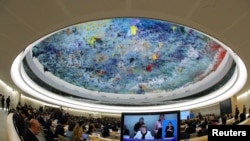The United States is among 14 countries whose human rights records will be examined under the U.N. Human Rights Council’s Universal Periodic Review. The two-week session, which opens Monday, will be held both in-person and remotely because of the coronavirus pandemic.
The Universal Periodic Review, or UPR, is a unique process in that the human rights records of all 193 U.N. member states, regardless of how weak or powerful they are, come under scrutiny. All states have participated at least twice since the process began in 2008. They now are in the midst of having their records reviewed for a third time.
One of the successes of the UPR is that it has a 100 percent participation rate. Human Rights Council spokesman Rolando Gomez says the UPR is an opportunity for states to highlight advances they have made in the area of human rights.
He agrees some countries may be particularly notorious human rights violators but adds none has a stellar record. All have issues that can stand improvement. He tells VOA it is the prerogative of a state whether it chooses to address these issues in a genuine manner.
“If by chance they do not address their own issues in a genuine manner, there are states who are taking part in this who will certainly shed light on those issues," he said. "They would not miss that opportunity through the UPR… But they certainly cannot conceal the violations that they are committing… the alleged violations they are committing. And, with membership, I should point out that they certainly cannot escape any form of scrutiny either.”
Gomez says many good things have emerged from this process. He notes people have benefited from the implementation by states of recommendations made at the UPR. For example, he says literacy rates have increased in some countries, minority religions have been approved by constitutional orders in others and prison conditions have been improved.
Gomez says the United States has been actively involved in the UPR process, despite having relinquished its seat as a member of the U.N. Human Rights Council. He says the U.S. will come under review on November 9.
“I can tell you that from the reports, which are already in the public domain on this review the situations of people of African descent, racism, discrimination, police brutality — these are some of the issues, which will be addressed during this review,” he said.
Gomez says other issues, such as the situation of migrants in the U.S. also will come up. Because of the coronavirus, he says most of the participants will testify remotely from Washington. He says Secretary of State Mike Pompeo is expected to make a statement.




